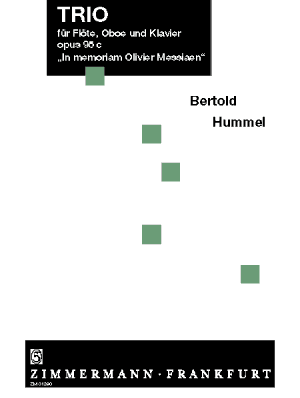Trio "in memoriam Olivier Messiaen" for Flute, Oboe and Piano op. 95c (1992)

I.
Melismen ![]() beginning
beginning
II.
Monogramme
II. Metamorphosen
Première:
April 29, 1993, Freiburg, Friedrichsbau
Thomas Richter / Gerhard Schnitzler
/ Monika Stöhr (Trio Papillon)
Duration: 15 minutes
Publisher: Zimmermann Musikverlag Frankfurt ZM 31290 / ISMN: M-010-31290-3
Video: hummel works on youtube
The Trio for flute, oboe and piano Op. 95c is a personal homage to Olivier Messiaen whose death became known shortly before this work was composed.
Melismas reminiscent of bird song dominate - in various variations - the 1st movement, the structure of which is determined by a cadence contributed by each wind soloist. The intermediate parts feature small-scale development sections. Based on a pedal point (a-flat) held by the oboe, the flute
concludes the piece by playing a decrescendo passage repeating the note material from the beginning.
The 2nd movement is characterized by sustained tones and concise motifs. Being "economical" with the material, this movement forms a strong contrast to the outer movements.
The basic note material of the 3rd movement comprises the letters from OLIVIER MESSIAEN's name that can be used musically: E-E-Eb-Eb-A-E
In the middle section, a sequence of chords repeated over and again forms the basis for a melodic line from Messiaen's opera "Saint Francois d'Assise" - thus creating a kind of short passacaglia. After developing the note sequence from "Saint Francois", the basic material gradually intensifies towards a climax which is suddenly terminated by an unexpected coda. Concluding the work, the main motif fades away in a gentle noise environment.
The work is dedicated to the Trio Papillon and was premiered by this ensemble on April 29,1993, in Freiburg im Breisgau.
Bertold Hummel
(english translation by Holger Klier)

Yvonne Loriod-Messiaen 1999
Amongst works of recent times, one composition deserves special mention, the "Trio" for flute, oboe and piano, op. 95c. In it, a proximity of Hummel to Olivier Messiaen is manifest, as was often to be detected in his teaching of composition, a task he carried out at the Music College, Würzburg until 1987. Perhaps more than any of his other worthy models, it was his great colleague in Paris whose thinking and compositional technique left a lasting impression on Hummel's creative work. And it was to the memory of this man that he created a memorial in sound shortly after the announcement of Messiaen's death. Not only bird calls - as are often to be heard in Hummel - remind one of the great ornithologist with the passion for music, nor the E - E - E flat - E flat - A - E motif, which recalls the name Olivier Messiaen: the whole sonority of the composition brings the model back to life. Melismas, Monograms, Metamorphoses: three movements - and three times the letter M! Seldom has Hummel avowed his model as clearly as here. It is legitimate to understand this as a testimony of genuine grief over the loss of a revered master; in recognising this, we have reached one of the roots of the chamber music of Bertold Hummel.
Klaus Hinrich Stahmer (in "Kammermusik als persönliches Bekenntnis", Tutzing, 1998)
Press
Heidenheimer Zeitung 10th May, 1999
A genuine homage to Messiaen is the first movement: scurrilously flitting bird calls, performed in perfect parallels by flute and oboe. Sensitively modulated individual notes make out of the middle movement "Monograms" the real lament. In stringent chamber music style, the final movement "Metamorphosen" concluded Hummel's work, musically tight and entertaining.
Donau-Kurier 1st/2nd May, 2002
With his Trio, op. 95c, Bertold Hummel honoured the memory of the mystic of bird-song, Olivier Messiaen - and so it is no surprise when the piece begins like a concert of mourning birds. The trills, calls, appoggiaturas combine in the striking "speaking" phrases of the woodwind to form fragments of lyrical lament and outbursts of grief, until the piece gradually moves away from the imitation of nature and follows purely musical impulses - and finally becomes mute in a kind of unfocused sound background.